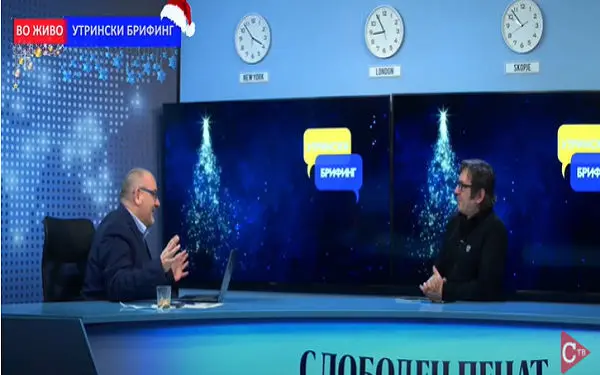“The thesis of the Executive Director of Human Rights Watch has been going around since last year.It is in a way a continuation of a positive trend that the HRW is seeing, unlike what others see, I would say, almost all other relevant human rights NGOs in the world. It’s about the fact that, according to him, there is huge democratic potential in citizens throughout the world, and he considers that it is a potential that in a very near future will stop the trend of autocratization in countries”, says the President of CIVIL, Xhabir Deralla, in relation to the Annual Human Rights WatchReport, in the Morning Briefing show.
“The Director of HRW also notes in the report, and this was also noted by my colleague Mishev in CIVIL MEDIA yesterday, that often democratic leaders, pressed by great troubles, such as the pandemic and other processes, happen to flirt with populism, and at the same time forget their basic tasks, and that being to fulfill expectations, hopes, to protect the citizens from their human rights being endangered, and that is an excellent appeal to them, actually, pressure on them, Human Rights Watch is not a children’s toy. I believe this will encourage them to fight more categorically for the protection of human rights. Otherwise, the report itself contains serious analyses of the situation in more than a hundred countries in the world, good news is that North Macedonia is not among them. North Macedonia is mentioned in HRW this year, among else, that it has its own representative in a UN body that deals with human rights, in Sri Lanka, for example, which is a small exclusivity, but is also mentioned in other parts of HRW this year and the end of last year, because the tail of the cooperation of the state authorities with the CIA, that is, with the secret prisons all over the world, is still dragging on. We are one of the countries, in the case with El Masri, which was put on that list. It’s still dragging on, there are still actions in that sense, hence, here we can illustrate in a way…
Regardless which structure is in power in a country, that simply is the state. HRW sees us as a state, not as a government or anindividual one, one or another. And that tail will be dragging on for much longer, one should be careful, regardless of who is in power, one should be careful, not to leave a black mark on the image of the country. It’s good that HRW recognizes that we, as a country, this year do not have to be in their report as a separate chapter, which was not the case until five years ago. For example, in 2016, we are among the more seriously analyzed countries with a series of problems, primarily with freedom of expression, but also the rule of law, violation of human rights in many areas”, points out Deralla.
In regards to the HRW report that also refers to democratic countries, such as the United States, Deralla says that it’s especially important that the report is fierce precisely for the United States, because as it’s known, it concerns the situation of human rights during Trump’s term.
“What was going on at the end of Trump’s term is shocking, and I recommend that at least that chapter be read. It’s interesting that in the Balkans, Serbia, Kosovo and Bosnia and Herzegovina are represented in this report, Greece is constantly talked about, for years in HRW, about their attitude towards migrants. In 2016, we too were exemplified with serious problems in the manner of dealing with the migrant crisis. Simply, when it comes to a migrant crisis, as you see, they are now being ‘weaponized’, that is, the migrants themselves are becoming weapons of the war lately, like at the Polish border… The thing is that when you talk about migrants, there simply is no system that can treat them as they should be. It is a challenge before which you can first sign a capitulation and then see to it that you don’t do something that is called a disaster”.
“I would like to say that we should not be happy with the fact that we are not too present in HRW, because we can easily find ourselves in such reports, if we loosen up. Democracy is something that we must also constantly nurture and promote, because there is never enough democracy”, said Deralla at the end.
D.T.
Translation: N. Cvetkovska















